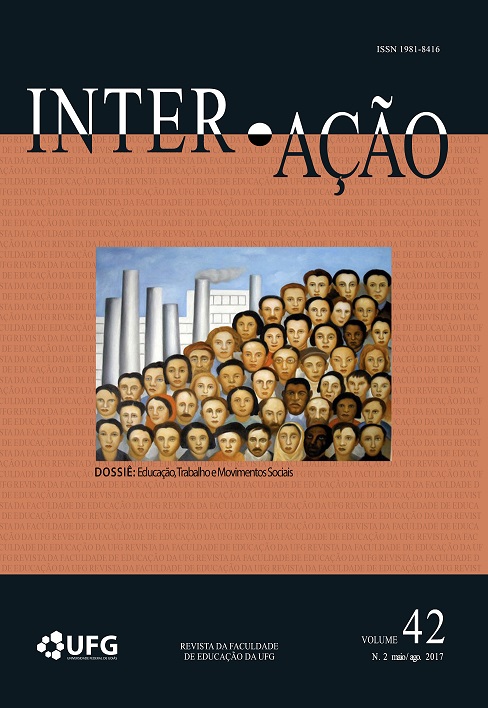O MOVIMENTO DE OCUPAÇÃO DE ESCOLAS PÚBLICAS E SUAS CONTRIBUIÇÕES PARA A EMANCIPAÇÃO HUMANA
DOI:
https://doi.org/10.5216/ia.v42i2.45756Keywords:
Movimento Estudantil. Ocupação de Escolas. Transformação Social. Emancipação Humana.Abstract
O presente texto propõe reflexões sobre as contribuições do movimento de ocupação de escolas públicas, ocorrido nos anos de 2015 e 2016 no Brasil, para a formação dos estudantes. Para tanto, a partir de pesquisa bibliográfica, apresenta as dimensões educativas dos movimentos sociais tendo em vista a formação na e para a vida evidenciando o caráter educativo das ocupações das escolas. Com base na análise da organização das ocupações, em cotejamento com a bibliografia, conclui-se que o movimento de ocupação de escolas, contribuiu para a produção de conhecimentos revolucionários imprescindíveis para a emancipação humana.
Downloads
Downloads
Published
How to Cite
Issue
Section
License
Inter-Ação uses the Creative Commons Attribution 4.0 License for Open Access Journals (Open Archives Initiative - OAI) as the basis for the transfer of rights. Open access means making documents available on the Internet free of charge, so that users can read, download, copy, distribute, print, search, or link to the full text of documents, process them for indexing, use them as input data for software programs, or use them for any other lawful purpose, without financial, legal, or technical barriers.
Authors publishing in this journal agree to the following conditions:
1) Authors retain copyright and grant the journal the right of first publication, with the work simultaneously licensed under the Creative Commons Attribution License, which permits redistribution of the work with attribution and first publication in this journal.
2) Authors are permitted to enter into additional, separate agreements for non-exclusive distribution of the version of the work published in this journal (e.g., for publication in an institutional repository or as a book chapter), with attribution and first publication in this journal.
3) Authors are permitted and encouraged to publish and distribute their work online (e.g. in institutional repositories or on their home page) at any time before or during the editorial process, as this may generate productive changes as well as increase the impact and citation of the published work.















